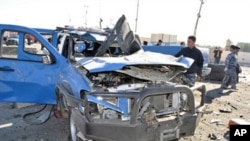Back-to-back suicide-bombings in Iraq's Anbar province capital of Ramadi Monday have caused more than a dozen casualties. Iraqi TV says the target of the explosions was a government complex and that many of the victims were policemen.
It at least the third time bombers have targeted the same Ziyout round-about near provincial headquarters in just under a year.
Iraqi government TV showed police standing amid debris at a checkpoint inside the circle, inspecting the twisted carcasses of several vehicles. The force of the explosions appears to have dug several giant craters in the pavement, as dirty water gushed into the road from broken mains.
Al Arabiya TV reported that the initial explosion was caused by a suicide-bomber driving a truck and that a second suicide-bomber blew himself up minutes later, amid police and rescue workers.
Rescue vehicles ferried numerous casualties to Ramadi's provincial hospital. Eyewitnesses say many of the victims were members of Iraq's security forces, but that civilians, including women and children were among the casualties.
News reports say that Monday's bombings come one day after a new police chief took office in Ramadi. They also come not more than a week after the formation of a new Iraqi government by Prime Minister Nouri al-Maliki.
Iraq expert James Denselow of King's College London argues that with Iraqi political leaders apparently settling their grievances, it appears that a low level of endemic violence will subsist.
"It's a case of bloody deja-vu: same tactics, same targets, this low-level war against the Iraqi security forces," he said. "I think considering the progress in the political process we can almost now see what can be considered the levels of endemic violence that will be expected in Iraq, that is far closer to Somalia than it is to other more stable countries in the Middle East."
Denselow stresses that such bombings underscore the fact that Iraqi security forces are having difficulties in protecting themselves, not to mention the population that they are serving.
He also notes that the ongoing political negotiations to fill the remaining unfilled cabinet posts are a complicated process that involves not just pleasing certain groups, but trying to prevent others from being upset.
"I think we're in a bargaining phase," he added. "It's an incredibly tortuous process. But, ultimately there is a lack of far-sightedness in this process. The people are viewing the state as the prize. It's to be captured. It's to have various ministries and their patronage elements controlled and there's no real thought to what happens next even when they do eventually come out with this tortuous compromise, which is likely a form of government gridlock."
In other developments Monday, Iraqi police say they arrested two men as they prepared to detonate a car bomb by remote control, outside a stadium in Diyala province. Three members of the same family were also killed in Dujail, north of Baghdad, when a roadside bomb destroyed their vehicle.
At Least 12 People Killed in Iraq Suicide Bombings




